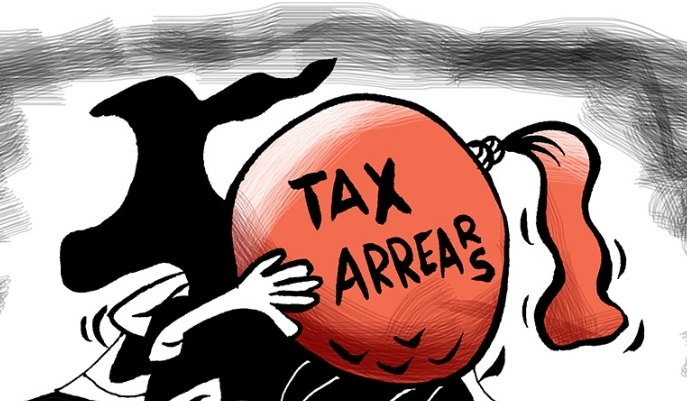
- Changes to be made in the legal process to make tax collection more efficient discussed under the chairmanship of the Minister of Justice.
- The arrears tax revenue due on 30.06.2023 is 943 billion rupees
- Even the taxpayers who have been identified as having to pay taxes have not paid taxes
- Under existing laws, tax can be evaded for 15 years
- Urgent steps to amend existing laws
A special meeting was recently held in the Parliament under the chairmanship of the Minister of Justice, Prisons Affairs and Constitutional Reforms, (Dr.) Wijeyadasa Rajapakshe, to obtain ideas for the legal amendments to be made in order to increase the state revenue.
Accordingly, there was a discussion at length about bringing necessary legal amendments to regulate the Inland Revenue Department, Sri Lanka Customs and Excise Department.
Mahindananda Aluthgamage, Chair of the Sectoral Oversight Committee on National Economic and Physical Plans, addressing the meeting, explained that the Inland Revenue Department had been brought before the Sectoral Oversight Committee on several occasions and stated that there were a number of issues identified.
The Chair further explained that any person can stay for 15 years without paying taxes.
The Inland Revenue Department has 30 months under the existing Act to assess a tax file and another 24 months to consider appeals.
Accordingly, a tax file remains in the Inland Revenue Department for more than 54 months and post appealing to the Tax Appeals Commission, they receive 2 years according to the Act, he said.
Thereafter, appeals can be made to the Court of Appeal and the Supreme Court and it will consume approximately 15 years, he said.
The officials of the Inland Revenue Department addressing the meeting stated that the arrears tax revenue due on 30.06.2023 is 943 billion rupees, and the amount cannot be recovered due to various reasons is 767 billion rupees and the recoverable amount is 175 billion rupees.
Moreover, the officials further explained that 37 billion rupees have been collected as tax arrears this year.
Once the tax report is received by the Inland Revenue Department on or before the 30th of November every year, the officials who explained the process pointed out that after receiving the tax report, the relevant officer will enter the information into the RAMIS system and identify cases where there are problems, and then an audit will be conducted, and that in some cases further information will be brought to make some clarifications.
The officials also pointed out that in cases where such information is requested, often the tax holders deliberately delay the information.
The officials pointed out that the existing Act has 30 months for the tax report to be audited by the officer and after that there is another two years to hear the appeal after appealing to the Commissioner General.
The Committee was of the view that the current pried of two (02) years for the Commissioner to hear appeals is too long and it is desirable to reduce it to six (06) months. However, if the decision is not given within 06 months, it should be assumed that the assessment amount will not change, the Minister of Justice said.
Therefore, it was suggested that the Act should be amended to require that taxpayers should pay at least 50% of the assessed amount if they appeal to the Tax Commission.
The powers of the Tax Appeals Commission were also discussed in the Committee. Accordingly, the attention of the Committee was focused on making some amendments to the Tax Appeals Commission Act.
Currently, the Tax Appeals Commission has 270 days to hear an appeal and the Minister pointed out the need to give some time frame for that. The Committee decided that the Tax Appeals Commission should consider only the existing questions about the assessment amount or calculations and if there is any objection to the basic issues, then the necessary amendment to the Act should be brought for appeal to the Court of Appeal.
The Committee was of the opinion that it is appropriate to reduce the 30-month period to one year for the assessment of the Act. After a long discussion, the Committee decided to keep the 30 months as it is, but it is appropriate to give the necessary power to the Minister of Finance to change the period through the Gazette in cases where necessary.
Accordingly, as an amendment to the Act, it was proposed to include in the Act that after receiving the tax appeal to the Commissioner General, his order should be given within 6 months and if not, it is assumed that the initial assessment is final and permanent. Accordingly, if the taxpayer does not agree with the decision, he can appeal to the Tax Appeals Commission within one month.
The Tax Appeals Commission shall render its decision within six (06) months and the Tax Appeals Commission shall only have the power to inquire into the existing calculations of the assessed amount by the Inland Revenue Department. Other preliminary objections such as questions of law may be appealed to the Court of Appeal. It was also suggested in the Act that the appeal court should also be given a certain time frame, that is, the appeal should be heard within one year.
The Minister of Justice also agreed to establish a special court complex within the judicial system to hear tax appeals.
The Committee decided to draft amendments to the Inland Revenue Department Act by incorporating the matters raised in this discussion by the Attorney General and the legal draftsman and after preparing the amendment, the Committee decided to meet and discuss again in the next day in Parliament. (Parliament)